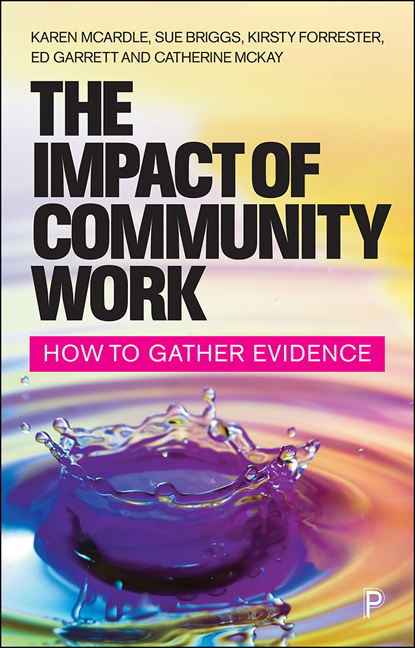6 - Anecdote and Observation
Published online by Cambridge University Press: 10 March 2021
Summary
Introduction
This chapter looks at the importance of anecdote and observation. As practitioners, we constantly observe, as a matter of course, the groups, communities and individuals with whom we work. For example, when delivering training to a group, Ed looks for signs that show him if the training is going well or not; how people respond to tasks; how engaged participants are; and how they relate to each other. We use these observations, sometimes explicitly but often implicitly, to build our evidence of impact. So, a good understanding of the use of observation in showing evidence of impact is an invaluable skill for any practitioner, because it is something we all do anyway as part of our community work. Just as important, however, understanding exactly how we can use observation in building evidence is a key part of our practice as community workers and it can define our relationships with other professionals too. As Chapter 3 argued, as community workers, we often deal most closely with the local, the anecdotal and the historically situated, and this kind of knowledge is not always highly valued. Different forms of knowing are valued differently by different people. Observation is largely about this kind of local evidence, and if we can understand it better we can justify it better to others.
Different ways of observing
Observation, as a method, has a central place in social science research. This is not a book about research methods, but it is important to distinguish between different ways of observing to understand exactly what we do as practitioners working with communities. First, observation can be overt or covert. In covert observation, the observer participates in the community or group they are observing, without making this clear to that community or group. This approach can generally be ruled out as problematic ethically. As this book has stressed several times, the ethics of evidence gathering are as important as the actual evidence gathered. If communities are being observed as part of evidence gathering, they should be made aware of this. There may be some general observations we can make about communities that are valuable, but, as soon as we observe specific groups and individuals, we need to make our role clear (which it generally would be anyway, we suggest).
- Type
- Chapter
- Information
- The Impact of Community WorkHow to Gather Evidence, pp. 105 - 118Publisher: Bristol University PressPrint publication year: 2020

